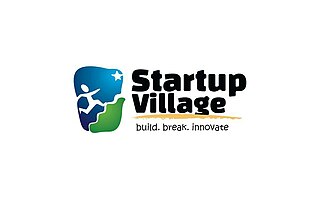A startup or start-up is a company or project undertaken by an entrepreneur to seek, develop, and validate a scalable business model. While entrepreneurship refers to all new businesses, including self-employment and businesses that never intend to become registered, startups refer to new businesses that intend to grow large beyond the solo founder. At the beginning, startups face high uncertainty and have high rates of failure, but a minority of them do go on to be successful and influential.
Business incubator is an organization that helps startup companies and individual entrepreneurs to develop their businesses by providing a fullscale range of services starting with management training and office space and ending with venture capital financing. The National Business Incubation Association (NBIA) defines business incubators as a catalyst tool for either regional or national economic development. NBIA categorizes its members' incubators by the following five incubator types: academic institutions; non-profit development corporations; for-profit property development ventures; venture capital firms, and a combination of the above.
Social venture capital is a form of investment funding that is usually funded by a group of social venture capitalists or an impact investor to provide seed-funding investment, usually in a for-profit social enterprise, in return to achieve an outsized gain in financial return while delivering social impact to the world. There are various organizations, such as Venture Philanthropy (VP) companies and nonprofit organizations, that deploy a simple venture capital strategy model to fund nonprofit events, social enterprises, or activities that deliver a high social impact or a strong social causes for their existence. There are also regionally focused organizations that target a specific region of the world, to help build and support the local community in a social cause.

Michael Jones is an American entrepreneur and investor. Jones is currently the CEO of startup studio Science Inc. In 2017, Jones was named one of Los Angeless 500 most influential people by the Los Angeles Business Journal.

Qatar Development Bank (QDB), previously known as Qatar Industrial Development Bank, is a bank in Qatar offering financial services, banking and loans to the development of the industrial, tourism, educational, health care, agricultural, animal resources and fisheries sectors of the Qatari economy. It was created in 1997 by Emiri Decree No. 14 with the objective of diversifying Qatar's economy by promoting developmental projects.
The Louisiana Business & Technology Center (LBTC) at Louisiana State University plays an important role to the state's flagship university, Louisiana State University as a part of LSU's Office of Research and Economic Development. LBTC's primary goal is to increase the economic growth of Louisiana by enhancing the development of small businesses and assisting in the development of new businesses. The center is ranked among the top ten entrepreneur programs in the nation. In 1988 it was jointly funded through LSU and the Greater Baton Rouge Chamber of Commerce to foster economic growth in Louisiana by providing businesses with applications and tools necessary for growth and survival in the real world. It comprises the Louisiana Technology Transfer Office (LTTO), the LBTC Business Incubator, and the LSU Student Incubator.
The startup scene in Finland has given birth to companies such as Angry Birds, Supercell, Wolt, and many others.

Steve Guengerich is an entrepreneur, educator, and author of several books and numerous articles on information technology.

Harvard Innovation Labs (i-Lab) is an institution which aims to promote team-based and entrepreneurial activities among Harvard students, faculty, entrepreneurs, and members of the Allston and Greater Boston communities. The i-Lab's mission is to bring together students from Harvard's various schools to foster innovation across the University.

A startup ecosystem is formed by people, startups in their various stages and various types of organizations in a location, interacting as a system to create and scale new startup companies. These organizations can be further divided into categories such as universities, funding organizations, support organizations, research organizations, service provider organizations and large corporations. Local Governments and Government organizations such as Commerce / Industry / Trade departments also play an important role in startup ecosystem. Different organizations typically focus on specific parts of the ecosystem function and startups at their specific development stage(s).

Startup Village is a not-for-profit business incubator based in Kochi, Kerala, India, started in April 2012. The organisation aimed to launch 1,000 technology startups over the next ten years and start the search for the next billion-dollar Indian company. It focusses primarily on student startups and telecom innovation. It is India's first incubator that is funded jointly by the public and private sectors. As of October 2013, Startup Village has supported 450 startups through Incubation and Virtual Incubation combined. Businessman Kris Gopalakrishnan is the chief mentor at Startup Village.
Prehype is a venture development firm that focuses on building products and companies through collaboration with corporations and venture capitalists. The firm allows large companies to benefit from the energy and creativity of entrepreneurship without losing the organizational domain expertise and control. Prehype has offices in New York City, London, Copenhagen, and Rio de Janeiro, and was founded by Henrik Werdelin in September 2010. In addition to venture management services, the firm provides angel investments and access to a network of talent including entrepreneurs, engineers, designers, and developers.
In business, a unicorn is a privately held startup company valued at over US$1 billion. The term was first published in 2013, coined by venture capitalist Aileen Lee, choosing the mythical animal to represent the statistical rarity of such successful ventures.
A startup studio, also known as a startup factory, or a startup foundry, or a venture studio, is a studio-like company that aims at building several companies in succession. This style of business building is referred to as "parallel entrepreneurship".
Rocket Internet SE is a European Internet company headquartered in Berlin. The company builds startups and owns shareholdings in various models of internet retail businesses. The company model is known as a startup studio or a venture builder.

Kerala Startup Mission is the central agency of the Government of Kerala for entrepreneurship development and incubation activities in Kerala, India. KSUM was primarily founded to undertake the planning, establishment, and management of the technology business incubator (TBI), a startup accelerator in Kerala, to promote technology-based entrepreneurship activities, and to create the infrastructure and environment required to support high-technology-based businesses.
Startup India is an initiative of the Government of India. The campaign was first announced by Indian Prime Minister, Narendra Modi during his speech on 15 August 2015.
Co-Creation Hub, commonly referred to as Cc-HUB or the HUB, is a technology-oriented centre located in Yaba, a district of Lagos. Founded in 2010 by Bosun Tijani and Femi Longe, it provides a platform where technology-oriented people share ideas to solving social problems in Nigeria.

F10 is a startup incubator and accelerator founded in 2016 focused on Fintech, Insurtech, Regtech and Deeptech. Its incubation and acceleration programs help startups in connecting with entrepreneurs, experts, mentors, and investors for early stage venture and late stage venture investing. The company was founded in Zurich and currently has operating hubs in Zurich, Singapore, Madrid, and Barcelona.







